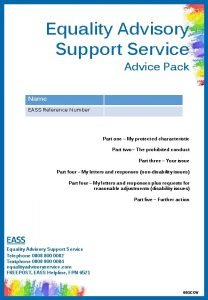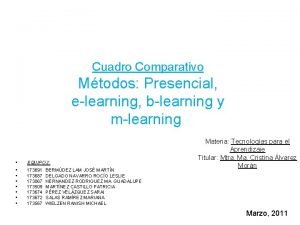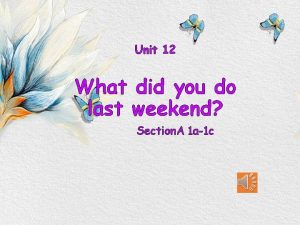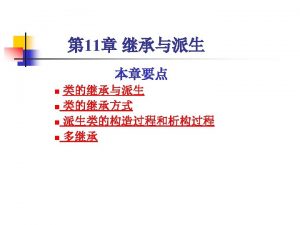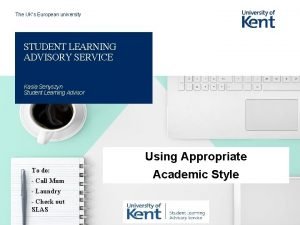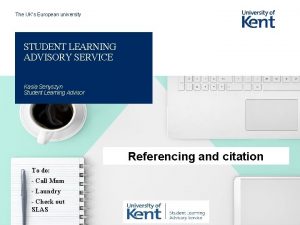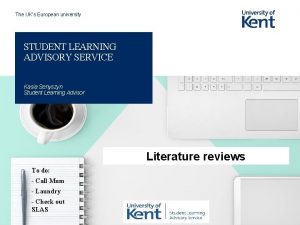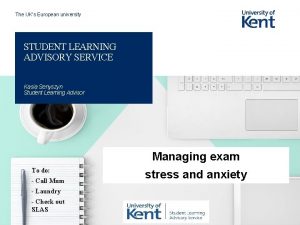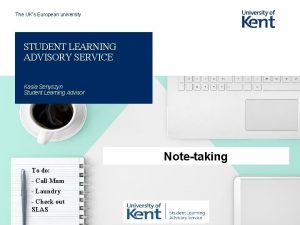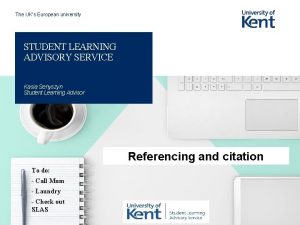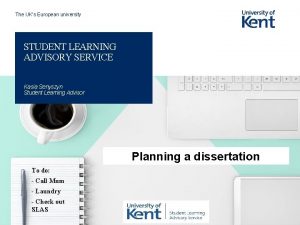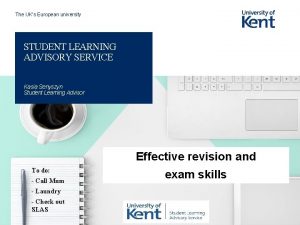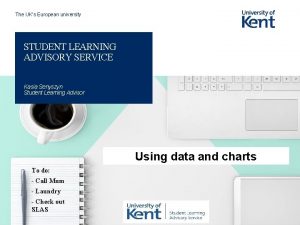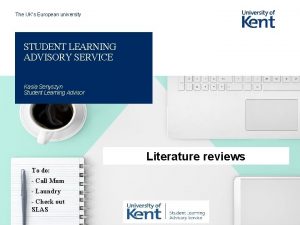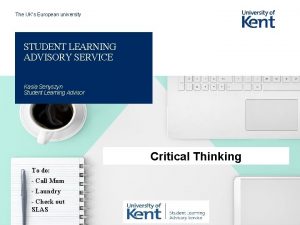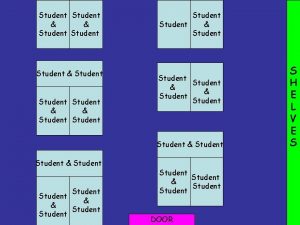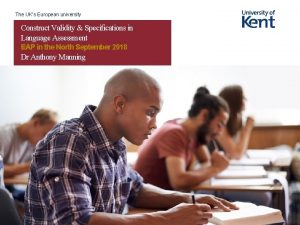The UKs European university STUDENT LEARNING ADVISORY SERVICE













































- Slides: 45

The UK’s European university STUDENT LEARNING ADVISORY SERVICE Kasia Senyszyn Student Learning Advisor Effective revision and To do: - Call Mum - Laundry - Check out SLAS exam skills

Welcome § When to revise (planning, time management) § What to revise (prioritising, selecting) § How to revise (methods) § Essays in exams § Managing exam anxiety § Top tips

Good revision… • Is targeted e. g. exactly what do you need to revise? • Is structured e. g. planned out/timetabled • Makes use of effective methods • Takes place within a suitable environment • Ends in exam rehearsals in order to perform optimally under pressure • In other words… good project management

Identify the task ahead • Number of exams • Exam dates and times • Duration of exams • Exam/coursework weighting • Credits of modules • Type of exams – e. g. essays/multiple choice/ problem questions/ exercises/ • Your coursework performance so far • Your understanding of the topic

How much to revise For essay questions (choice of questions) About 60 % > 8 topics (depends on exam format) For short answers/exercises & multiple choice All topics (depends on exam format) Therefore, for each module • Find out exam ‘format’ 4 essays in 2 hours, 3 essays in 3 hours, multiple choice, problem questions, exercises, short answer questions… • Make a list of all topics & identify ‘core topics’

When to revise Deciding when to start revising will depend on how many exams, when they are, your understanding of the topic etc. But, you should aim to… • Study regularly – treat it like a 9 -5 job • Revise when you are ‘receptive’ and ‘productive’ • Plan realistic study blocks (concentration tends to wane after about 20 minutes of focused work) • Stick your schedule as much as possible. Move on to other topics as planned but if it flows, let it flow! Tip: Your brain is cognitively more alert at the beginning of your day (whether this is at 7 am or 2 pm) – do the harder stuff first (understanding concepts etc)

Get organised • Weekly schedule and to-do list • Revise schedule daily if needed • Be realistic – manageable and achievable • Prioritise tasks and activities • Add deadlines to your schedule – work backwards • Say no to things you can, even temporarily • Do the easy/enjoyable things first – you’ll get through them quicker

Manage your time • Take regular breaks and plan for relaxation time and illness/unproductive days • Make your schedule work for you • Early bird or late riser? • Quiet or social study? • Distractions? • Make use of ‘dead time’ • Travelling/commuting • In-between lectures

Prioritise

Keeping your focus • Pomodoro method: 20 -min focus, 5 min brain break • Remove distractions (phones, productive procrastination) • Set realistic, achievable targets • Monitor progress, test yourself – are your strategies working? • Revise schedule as needed • Allow time for socialising (in moderation), relaxation and exercise • Set alarms for breaks etc

What to revise Start by looking at • Course outline/syllabus (learning outcomes) • Recommended reading lists • Essay & assignment topics • Topics emphasised by lecturers/tutors • Past papers (online/library catalogue) http: //library. kent. ac. uk/library/exampapers Tip: try to pick topics that are related or where you can use one example to evidence both topics

What to revise What are you looking for? • Facts (dates, events, people, data) • Concepts/themes • Theories • Terminology/key words • Legislation • Equations/formulae/rules • Debates • Definitions • Processes/sequence of events • Case studies/examples/passages

How to revise Method effectiveness will vary. Key suggestions are: • Divide the material into manageable chunks • Vary activities to keep your brain engaged • Find techniques that work for you • Organise in a logical way (chronological, sequence of the module) • Work to your learning style: auditory, visual, kinaesthetic • What do you need to understand what do you need to remember? • REPETITION Don’t spend hours on making your notes pretty!

Revision methods: Memorising • Repetition • Reciting • Mnemonics (many volcanoes erupt mouldy jam sandwiches) • Test yourself

Revision methods: Memorising sea saucer cheese theory PINK harp table sandwich windy SICK jam GREEN fog GLUE essay distance pills sad India Lenin maybe plate holiday walnut bandage gloom hand happy dog book lost Fred

Revision methods: Memorising 1. How many did you remember? 2. Did you notice any patterns about which ones you remembered? • Colour • Sequence • Emphasis • Thematic

Revision methods: Freewriting Can help identify topics to revise • What do you know, how does it naturally come out? • Pick a word or idea (eg. ‘Benefits of theory X’) • Use the word/phrase in a sentence • Repeat last sentence if stuck • Don’t stop until no more words • Ignore grammar and punctuation • Keep writing for five minutes

Revision methods: Module audit Take module outline and break into short phrase/single word topics Put the topics in the appropriate columns Strong topics Not sure Weak topics Analyse the pros and cons of revising some or all.

Revision methods: Change it up • Record yourself and listen back/listen to lecture recordings • Use colour, tabs, graphic recording etc to give emphasis • Read aloud or explain a topic to a friend • Try mind maps, spider diagrams, posters etc to visualise topics

Revision methods: Notes • Post-Its Limit to quick facts • Index cards Key facts/ideas on smaller topics • Print and annotate lecture slides • Write out by hand (kinesthetic memory) • Convert info into tables/charts to make it easier to digest Tip: Make notes portable (short documents you can print, phone notes, index cards etc) so you can keep them on you and have a look during ‘dead time’ – waiting at the doctors, getting the bus to campus etc

Revision methods: Group study • Pick a topic and become a specialist and then teach your peers the key points, do a Q&A or take turns to create pop quizzes • Split into teams and debate an issue/theory • Working with friends on other courses? Set yourselves targets for a session and check in at agreed points – quiz each other

Exercise First, write a list of modules you will have exams on. Then, your choice (pick two): 1. Module audit 2. Freewriting 3. Mind-map 4. Spider diagram 5. Index card You have 15 minutes. Feel free to look up modules on Moodle etc but otherwise phones are off limits!

Take a break Comfort break

What are examiners looking for? • Thoughtful, reasoned responses • Evidence that you have learnt from the course • Evidence of selective application of knowledge • Focus on (i. e. understanding) the question • How well you’ve used the time during the exam • Clear, legible structure • Marks awarded for evidence of independent thought and evaluation Examiners look to award marks, not remove them!

Timed conditions Choice of questions? Practice timed conditions as part of your revision! • First selection of questions • Read questions again, carefully • Final selection of questions • Note your time plan No choice of questions? • Read all the questions • Read questions again, rapidly but carefully • Note your time plan • Go for the easiest and highest scoring ones first

How should you allocate your time? CB 343/17 LEVEL 4 EXAMINATION The Global Business Environment Thursday 1 June 2017 : 9. 30 am – 12. 30 pm (Three hours) There are TWELVE questions. Section A has TWO questions and Section B has TEN questions. The marks for Section A add up to 50 and the marks for Section B add up to 50. Candidates must answer SEVEN questions. ALL questions from SECTION A and any FIVE questions from section B. Credit will be given for use of examples from real life business practice

Essay questions in exams Analyse the question • What is the subject? • What are the instructions? What do you need to provide? • What are the key aspect(s), key terms/theories? • What evidence will you need to use? Planning 1. Draw up essay plan 2. Check plan against title – does it answer the whole question?

Essay questions in exams ‘Identify the socio-economic factors that can affect a pre-school child’s health. ’ Instruction Subject Aspect Scope

Essay question instructions Analyse/examine/investigate Take apart and give details of components – explain why something is the way it is. What has it been influenced by? Compare and contrast Look for similarities and differences between; perhaps conclude on which is preferable Define/outline Give a short description of the main points; give the main features, general principles - emphasise the structure, leaving out minor details

Essay question instructions Discuss/explore/describe/identify List and investigate components Evaluate Appraise the worth of something in the light of its truth or usefulness; assess and explain Summarise Give a concise account of the chief points of a topic, leaving out details/examples To what extent… Dichotic scale. Avoid being too binary, illustrate the complexities

Exercise: essay questions How can we break down these questions? 1. Summarise the Harry Potter book series 2. Compare and contrast London and Paris 3. To what extent is Netflix responsible for the demise of cinema-going? 4. Evaluate the Twilight films 5. Explore the relationship between the British and tea

Multiple choice / single answer questions • Allow time for editing/going back through answers • Skim-read the paper and questions • Where you think of a point/a piece of information at once, make a very brief note against the question • Now start your answers – keeping to your time-plan

Multiple choice / single answer questions Certain Not sure Rely on intuition/ “a hunch” only as a last resort! Try to convert into correct answers by: 1. Exclude incorrect answers 2. Look at ‘maybe’ answers No idea 3. Select from these what seems most likely

Managing stress and anxiety Unproductive Not looking after yourself Grinding teeth, biting nails Change in sleeping patterns Change in eating habits Getting ill Increase in smoking/ drinking Feeling irritable, moody or emotional

Exams: the night before • Don’t cram unless you have to • Check exam details (location, time, any required equipment) • Plan your route and schedule – leave plenty of time for issues with parking, buses etc • Get a good night’s sleep • Pack your bag: o Water o Student ID o Any medication you may need o Any required equipment eg. calculators, pens etc

Exams: on the day • Avoid large quantities of caffeine or sugar – crash • Eat – preferably a balanced breakfast/lunch but if you cannot face much then a banana will help (slow release) • Arrive in plenty of time • When you sit down, check that you are in the right seat and have the correct paper in front of you • Pay attention to any instructions on the paper or given by the invigilators

At the start of the exam • Get comfortable, relax and breathe • Read the information and follow all instructions • Look at weighting – ‘strong’ questions first • Read the questions through properly • PLAN 1 hour essay = 10 mins planning + 45 mins writing + 5 mins proof-reading/editing

During the exam • Stay aware of timing throughout • Leave time for reading the paper through • Remember: if you run out of time – a bullet-pointed answer is better than no answer… Thinking and planning time is essential

Panic recovery Put pen down, read what you’ve done so far, plan next steps MIND GOES BLANK Note everything you know about the topic Leave a gap and move to next question. Go back later Divide remaining time between number of answers – better to put some information in each rather than leave any blank if you can help it RUNNING OUT OF TIME LOSING FOCUS / GETTING CONFUSED Get main points down and any evidence, even if it is just in bullets. Go back later to fill in detail if you have time Stop writing and re-read the question Re-look at your plan – have you gone off track?

Relaxation exercises First: isolate yourself from any external distractions and sit in quiet space in a comfortable, grounded position 1. Elevator exercise: imagine your stress levels going down as the elevator travels through each floor 2. Breathe in through the nose, hold, out through the mouth, hold (4 seconds each) 3. Connect to your body and release the tension

Reflect Avoid post-mortems, but after a clear break… Reflect – analyse/learn/improve • What didn’t go as well as you hoped? • Why was that do you think? (revision or exam techniques? ) • What did you learn from the exam experience, what can you do to improve your performance next time? Revise your action plan accordingly Move on to the next period of revision/exam

Final tips • What works for you? • Avoid other people’s panic • Take regular breaks • Manage your time • Say “no” more • Set realistic, manageable targets/schedules/deadlines • Get organised – prioritise – think about ‘future you’ • Seek support – Student Support Officers, ILPs, Student Support and Wellbeing

Don’t forget… • Balance – you need ‘you’ time • Sleep, eat, exercise • Avoid too many stimulants including sugar • Breathe • You’ve done this before – you’ve got this! Inclusive Learning Plan deadline: 27 March 2020

Get in touch! Book 1 -2 -1 s and workshops via SLAS Connect on our website Pop in (we’re next to the bank) to pick up study and skill guides Email any queries or concerns Follow us on social media to pick up top tips www. kent. ac. uk/learning

THE UK’S EUROPEAN UNIVERSITY www. kent. ac. uk
 Sls singapore student learning space
Sls singapore student learning space Contoh buku daftar pasien uks
Contoh buku daftar pasien uks üks hani neli nina
üks hani neli nina Uks g8 bielany
Uks g8 bielany Obat-obatan di uks sekolah
Obat-obatan di uks sekolah Hubungan bidang studi pkn dengan mata pelajaran lain
Hubungan bidang studi pkn dengan mata pelajaran lain Attribution definition
Attribution definition Pj uks
Pj uks Tegese tembung prayogi yaiku
Tegese tembung prayogi yaiku Amas faa drugs
Amas faa drugs Manufacturing advisory service uk
Manufacturing advisory service uk Equality advisory support service
Equality advisory support service Ernst and young advisory
Ernst and young advisory Cuadro comparativo e-learning m-learning b-learning
Cuadro comparativo e-learning m-learning b-learning Epostl
Epostl European university association
European university association Dr andreas stephan
Dr andreas stephan European central university
European central university How did you...your last weekend
How did you...your last weekend What did they do last weekend
What did they do last weekend Clearinghouse student tracker
Clearinghouse student tracker Class maths student student1 class student string name
Class maths student student1 class student string name National student clearinghouse student tracker
National student clearinghouse student tracker Freckle.student.login
Freckle.student.login Good morning student
Good morning student Hình ảnh bộ gõ cơ thể búng tay
Hình ảnh bộ gõ cơ thể búng tay Ng-html
Ng-html Bổ thể
Bổ thể Tỉ lệ cơ thể trẻ em
Tỉ lệ cơ thể trẻ em Gấu đi như thế nào
Gấu đi như thế nào Tư thế worm breton là gì
Tư thế worm breton là gì Hát lên người ơi
Hát lên người ơi Môn thể thao bắt đầu bằng chữ f
Môn thể thao bắt đầu bằng chữ f Thế nào là hệ số cao nhất
Thế nào là hệ số cao nhất Các châu lục và đại dương trên thế giới
Các châu lục và đại dương trên thế giới Công của trọng lực
Công của trọng lực Trời xanh đây là của chúng ta thể thơ
Trời xanh đây là của chúng ta thể thơ Mật thư anh em như thể tay chân
Mật thư anh em như thể tay chân 101012 bằng
101012 bằng Phản ứng thế ankan
Phản ứng thế ankan Các châu lục và đại dương trên thế giới
Các châu lục và đại dương trên thế giới Thể thơ truyền thống
Thể thơ truyền thống Quá trình desamine hóa có thể tạo ra
Quá trình desamine hóa có thể tạo ra Một số thể thơ truyền thống
Một số thể thơ truyền thống Cái miệng bé xinh thế chỉ nói điều hay thôi
Cái miệng bé xinh thế chỉ nói điều hay thôi Vẽ hình chiếu vuông góc của vật thể sau
Vẽ hình chiếu vuông góc của vật thể sau











